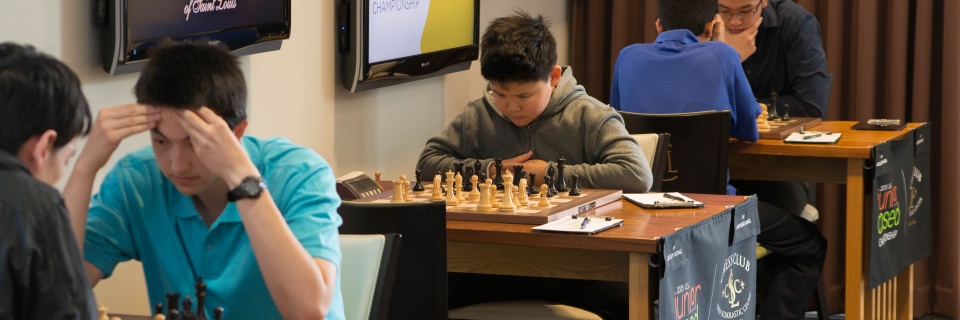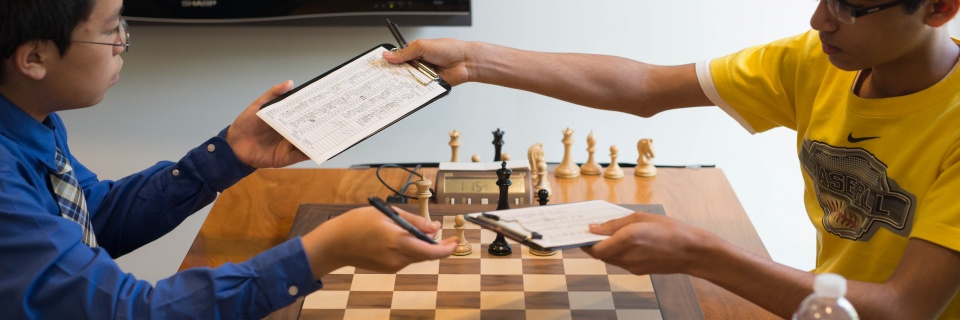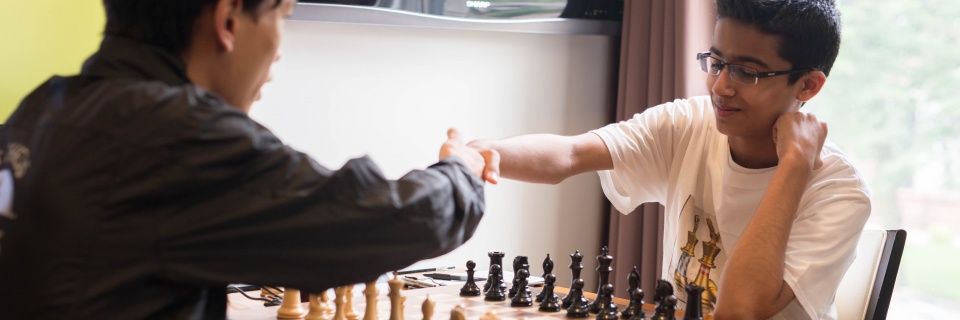2012 U.S. Championships News
Written and analyzed by GM Mackenzie Molner. Photos taken by Austin Fuller.
Akshat Chandra vs. Arthur Shen
Round eight featured the two leaders facing off in a pivotal game for this year’s U.S. Junior Championship. Chandra has maintained at least a shared lead throughout the entire tournament, while Shen’s 1 out 3 start was impressively improved upon with 4 consecutive wins. Shen’s game have been sharp and interesting with only decisive results. The two have been great entertainment for the fans and spectators watching. Shen chose a more solid opening today, relying on the Ruy Lopez defense against 1. e4. The way Arthur played allowed him the option of playing one of the many mainlines, or potentially a Marshall Gambit. Chandra chose 6. d3 which looks quiet but has a lot of advocates on the white side. It has the benefit of avoiding the Marshall Gambit which is extensively analyzed and doesn’t leave much room for either side to play for a win.
After a peaceful opening, the middlegame transformed into a very complicated struggle. Shen sacrificed a pawn to deal with pressure against his f7 pawn. He got a lot of compensation in return. Both sides had a lot of potentially interesting continuations in the middlegame but the big moment came when Shen played 19… e4. This turned out to be a big mistake even though it appeared as a natural looking move. Shen needed to be more patient; bringing his last pieces into the game. 19… bxc4 followed up by Qc7 and Rad8 would have given him respectable chances. His continuation in the game lost the positional trumps that he had, such as the strong light-squared bishop and central control. By the time he played 24… Qh4, Shen looked like he was generating some serious threats. However, with Chandra not being unfamiliar with king walks, he was planning to march his king up to safety on the f3 square.
The final turning point in the game happened when Chandra played Bxg4 on move 27. He eliminated one of Black’s best attackers. The rest of the game was characterized by a slow build-up from Chandra and eventually transforming his slightly vulnerable position into a position ready for attack. The final blow came with 33. Nxh6. Shen’s kingside was collapsing completely and he was soon resigning and giving Akshat sole first place once again! A very exciting game with huge implications at the top of the standings.
Ruifeng Li vs. Curran Han
Ruifeng Li has been in a similar boat to Yian Liou throughout this tournament. He had several incredible opportunities to knock off the leaders, Chandra and Xiong, but failed to do so. If he had converted, he would be in great position to compete for first. Like Liou, he would not give his opponent any second chances in round eight. Unfortunately, Han’s struggles would continue once again even though the opening battleground would be slightly different. Ruifeng chose the Closed variation of the Sicilian for White and gradually earned enough positional advantages to bring down his opponent. 39. e6 was the highlight of the game, breaking down Black’s kingside.
Jeffrey Xiong vs. Awonder Liang
Jeffery Xiong needed to win today if he wanted to maintain realistic chances of competing for first place. Awonder Liang who had started off the tournament on fire, had cooled off over the last few rounds and was struggling to return to his high quality play. His struggles continued today when paired against the highest rated player in the tournament. Liang chose the Benoni defense against Xiong’s 1. d4. I don’t recall this normally being a part of Awonder’s opening repertoire, but he did manage to reach an acceptable middlegame position. Jeffrey’s experience and positional skill eventually grounded his young opponent, leading to a complete collapse of Black’s position by the time he played the classical blow against the Benoni, e5 on move 27. Xiong has black tomorrow against Han, who has been struggling this tournament. The win keeps pressure on Chandra to at least draw tomorrow.
Yian Liou vs. Mika Brattain
I imagine coming into this game Liou must be feeling unsatisfied with the results he has gotten so far. He could have easily been competing for the top spots had he finished off his opponents in several winning positions. For round eight against Brattain, he could not leave his opponent with tricks or resources. Brattain chose an offbeat opening that is a favorite of the strong American GM Varuzhan Akobian. The opening did not achieve the desired result and by the time 16. Nf5! it was clear that Black would be under big pressure for a long time. The position was extremely difficult to play, and Brattain’s position quickly collapsed. Liou collected the full point on move 24.
Luke Harmon-Vellotti vs. Michael Bodek
In round seven, Bodek was on the wrong side of a big swindle in losing to Arthur Shen. Round eight held hope for redemption. He was on the Black side of a very positionally oriented Nimzo-Indian defense. The game featured a Carlsbad pawn structure often seen in d4 openings. Bodek commented after the game that 14. Qb4 was where White began to go wrong because White usually intends to play b4-b5 with a standard minority attack situation. Despite this slight inaccuracy White’s position remained extremely solid and it was only by the time Black played 25… Nh5 that White was in trouble. Bodek convincingly built his advantage from that point onward and gave White no second chances. Black won on move 50 creating the fifth decisive game of the day!
Written and analyzed by GM Mackenzie Molner. Photos taken by Austin Fuller.
Jeffrey Xiong vs. Akshat Chandra
Easily the most anticipated game of the tournament: Jeffrey Xiong vs. Akshat Chandra. In addition to being the two highest rated players of the tournament, the winner of this game was guaranteed at least a share of first place. Jeffery Xiong, with the White pieces, couldn’t ask for a better situation in order to try to make a comeback over Chandra, who had half a point extra in the standings.
Recently, the opening had been a source of headache for Akshat Chandra. In the two rounds prior to this, he was on the worse side of two draws, not to mention being massively behind on the clock in both games. He broke that trend in round seven by playing the Taimanov Sicilian more confidently than in his game against Ruifeng Li. Chandra was the first one to deviate from previous played games with his move 12… Rc8, even though it was a logical novelty. Chandra declined a pawn sacrifice on move 16, intending to safen his king by castling. It turns out that , accepting the pawn sacrifice with 16… Qxc2 would probably have lessened the pressure. Iin order for White to regain the pawn, Xiong would have to allow Black’s pieces to free themselves. Xiong built up strong pressure but took his foot off the gas with 23. cxb4. It was better to play 23. Rh3 with attacking chances.
The more critical phase of the game was beginning to take shape once the players traded queens and headed into the endgame. The endgame was approximately equal but a lengthy king maneuver taking Xiong’s king from g1 down to h6 reaped great benefits. Xiong won Chandra’s h7 pawn and was in firm control of the game. With an extra pawn and strong bishop, it looked like he might be able to knock Chandra out of the lead for the first time in the tournament. It only took one inaccuracy for Chandra to balance out the game. Xiong’s 51st move, Bf6 allowed Black’s strong reply 51… b4! and equalizing the game. The two played out another 30 moves before agreeing to the draw in a theoretically already drawn endgame. Another narrow escape for Chandra! With that draw, Chandra now has 5/7 and Xiong has 4.5/7 going into round eight.
 Curran Han vs. Yian Liou
Curran Han vs. Yian Liou
These two players have been struggling a bit this tournament. Han was winless going into the game, and Liou’s 1 out of 4 in the past 4 rounds had left him struggling a bit. Han got a great position against Liou’s Schlecter Slav, which is not easy to do! Unfortunately for Han, he lost the feel for the position in the middlegame. 27. Rca6 would have kept a large advantage. After 27. Rc1 the position leveled out and a draw was agreed upon on move 32.
Mika Brattiain vs. Luke Harmon-Vellotti
Going into the game, I thought this was an interesting matchup. In this tournament, Brattain has been a very positionally oriented player and often playing very solid openings. Harmon-Vellotti on the other hand is often involved in wild tactical skirmishes in which the result can often swing back and forth between the players. Brattain’s choice of playing the Botvinnik English took nearly all tactical possibilities from the position. White was more comfortable, and with 26. Ne4, Brattain could have kept his slight advantage. Instead, Brattain chose Bg5, soon leading to several exchanges. The game stayed balanced until a draw was agreed on move 48.
Last but not least was the game between these two talented players. After getting very lucky against Yian Liou in round 5, Ruifeng Li has been on the wrong side of swindles in the last two rounds. Li chose the combative Sicilian defense against Liang’s 1. e4. Liang sacrificed a pawn in the middlegame, reaching a very wild position. Li played fearlessly with his 17th move g5. Awonder needed to play 19. Bd6 in order to take advantage Li’s reckless play. Li’s combative play was rewarded, and he was soon able to reach yet another winning position. Unfortunately for him, he was not able to break the streak of draws and after playing 86 moves, the result was sealed.
Michael Bodek vs. Arthur Shen
Coming into the round today, no one in the tournament was hotter than Arthur Shen. He was on a three game winning streak and climbed from a minus score all the way to shared second place. Michael Bodek with 3 out of 6 was not as hot as Shen, but still having a reasonable tournament. The game started out in surprising fashion. Despite nearly exclusively playing 1. e4, Bodek experimented with the English in round seven, possibly trying to catch Shen in a prepared Anti-Grunfeld variation. Shen solidly responded by playing the symmetrical English. Shen’s 5… Nh6 allowed Bodek to play aggressively with the tempting 6. h4 and starting a quick kingside attack. The attack disoriented Black’s position enough for White to win a pawn while still having a better position on top of that. It looked like Shen’s winning streak was coming to an abrupt end, but a badly timed bishop exchange evened out the chances. In a back and forth fight, Shen eventually emerged victorious, using the attacking features of an opposite colored bishop middlegame to bring the point home. Shen’s hot streak lives on! He now shares first place with Akshat Chandra. What a turnaround!
Written and analyzed by GM Mackenzie Molner. Photos taken by Austin Fuller.
Arthur Shen vs. Mika Brattain
Arthur Shen is the only player in the tournament to have played all decisive games. The streak continued once again on round six! Going into the game, Mika Brattain, along with Xiong, was playing the most solid chess of the tournament. His Caro-Kann opening move perfectly melded with his solid style of play. Arthur chose the highly ambitious 3. f3, known as the Fantasy variation. In comparison to most other variations of the Caro-Kann, the Fantasy variation leads to more open positions than usual, often resembling the King’s Gambit.
Brattain played the mainline, but Shen added a slight twist to the variation with his move 7. Bd3. It’s more common for White to place the bishop on c4 but some strong players have recommended Arthur’s choice. It keeps the c4 square open for White’s d2 knight and keeps a better guard of the e4 pawn. Brattain handled the opening well and by move 16 had nearly equalized. His move Rc8 was slightly inaccurate and led to a stable advantage for White. 16… Qc7 was a better choice, allowing Black to bring the f8 rook to the defense of the queenside. Brattain could have improved on his 20th move by playing bxa4, equalizing completely. Shen made the most of this inaccuracy and built up pressure on Black’s c4 pawn. White won the pawn on move 27, leaving Black defenseless against White’s powerful central passers.
The 31st move was Black’s last chance to try to set up a defensive fortress by exchanging queens. Black may well be lost in this position anyway, but without the queen exchange, Mika had little hope to control White’s dangerous passers. There were a few tricks that Shen needed to avoid, such as 41. Qxf4?? allowing Qxh3 with a perpetual check. Rather than playing this blunder, Shen’s 41. Qd5+ forced the queens off and connected his center pawns. Black couldn’t offer any more resistance and resigned on move 46. This was the third win in a row for Arthur Shen! He joins Jeffery Xiong in joint second place and only a half point behind the leader, Akshat Chandra. That’s not bad considering 3 rounds ago he was a full 1.5 points behind!
Akshat Chandra vs. Michael Bodek
All eyes were on Chandra going into today’s game. He was leading by a half point over Jeffery Xiong. He was probably feeling quite lucky after narrowly surviving yesterday’s wild game against Li. It appeared that Chandra might be pushing his luck, taking a great deal of time in the opening. It’s possible that he wasn’t familiar with the opening, and as a result took a long time on the moves. This would make his two pawn sacrifice in the opening a curious choice, considering that it is usually most important to have opening knowledge in sharp positions. The game soon reached a repetition even though it looked like Bodek could press. Probably another fortunate result for Chandra.
Luke Harmon-Vellotti vs. Curran Han
Both players came into this game probably feeling a little unsatisfied with their scores thus far in the tournament. Today looked like a good day for Harmon-Vellotti to get back on track with the White pieces against Han. Harmon-Vellotti repeated his round one variation of the Grunfeld against Han. Han played the opening well and maintained balanced chances. Harmon-Vellotti might have been able to improve on his 20th move by playing Nxc3 but even then it would still be hard to crack Black’s position. Instead, after 20. bxa6 the position was unclear, but both players navigated the unusual position well. By move 43, the draw was certain, and agreed upon by both.
Yian Liou vs. Awonder Liang
The tournament started brightly for both of these contestants. Liou started with 2/3 and Liang started with 2.5/3! Despite the strong starts, both players have struggled and lost rounds 4 and 5. They would both be looking to win this game to have any chance at catching the leaders. It seemed that Liang was planning to play his standard opening, the Najdorf Sicilian. Liou would quickly play a sideline though that is currently increasing in popularity. Liou held a constant advantage for the rest of the game. At some points it was probably decisive but never easy to convert. In time pressure, after a very long game, Liou settled for a draw in a complicated but superior endgame.
Ruifeng Li vs. Jeffrey Xiong
Li’s game in round five was one of the most memorable of the tournament. He was White against the tournament leader, Chandra, and was crushing his opponent. A few more accurate moves and he would have won a miniature. Unbelievably, the same story happened today but with different opponents. Li was once again White but this time again the top seed, Jeffery Xiong. Xiong played the French defense, which must have been a surprise because Li thought for 10 minutes on move two. Despite being surprised, Li built up a monumental advantage by move 32. All he needed was one more accurate move. 32. Bh7 would have sealed the deal, but instead played Rh8+. A draw was soon agreed.
Written and analyzed by GM Mackenzie Molner. Photos taken by Austin Fuller.
Ruifeng Li vs. Akshat Chandra
Without a doubt, the game of the day was the match between Ruifeng Li and Akshat Chandra. Chandra went into the game today with a full point lead over the field, with an outstanding score of 3.5/4. Li, was looking to get back into contention with a win today. Li started out with his standard 1. e4 and Chandra responded with a different Sicilian today. Chandra might not have been as familiar with his choice, the Taimanov Sicilian, because at one point out of the opening he was down over an hour on the clock!
Li continued to play moves quickly, keeping the pressure on Chandra. Chandra’s position looked questionable and by move 15 he was already in serious trouble. A potentially disastrous mistake occurred on move 16 for Black, when Chandra chose to accept a pawn sacrifice that blew open his King’s position. This would have proved decisive if Li played the superior move 18. Rhg1. If Li played this, it wouldn’t be surprising to see Akshat resign. Li’s choice of 18. Bh6 was winning but allowed Black to resist. Chandra defended very creatively, marching his King from its castled position over to the queenside. This was definitely a risky thing to do, but by the time the King fulfilled its journey to the c7 square, it was completely safe!
Chandra was even able to begin a strong attack, forcing White to play moves that are usually very undesirable in the Sicilian, like 26. Nb1, and 27. Kd1. It looked like Chandra would somehow escape from a totally lost position all the way to an incredible victory. The position was still complicated though, and with such a major time disadvantage it would have taken some extraordinary play in order to navigate the complications in such a limited amount of time. The complications soon fizzled out to a drawish endgame when Li sacrificed an exchange in order to eliminate Black’s powerful dark-squared bishop. Neither player could do much in order to disturb the balance, and a draw was made shortly after the time control was reached. Without a doubt one of the most exciting games that we have seen this tournament, and a game in which all 3 results were possible! A great display of fighting spirit from the players.
Jeffrey Xiong vs. Yian Liou
Xiong has been off to a solid start, probably more solid than he would like. With the score of 2.5/4 he needed to start winning games in order to catch the leader, Chandra. Despite an extremely slow game with maneuvering struggle, he would eventually get his chance. He found a nice tactic in the endgame based on trapping Liou’s pieces in the middle of the board. This looked like the end of the story, but it was just the beginning. The players fought a strange rook+knight+pawn vs rook+pawn endgame that was nearly impossible to win for Xiong. The players continued in constant time pressure through move 125 before a final mistake from Liou. Xiong capitalized on this and took a win and moving himself within a half point of the lead!
Awonder Liang vs. Luke Harmon-Vellotti
Liang showed his impressive opening flexibility today with his choice of the 4. f3 Nimzo-Indian. The game followed the format of a game that Harmon-Vellotti played against GM Chirila. Liang was the first to deviate. This worked out in his favor, earning an advantage in a very imbalanced position. Liang made the most of his bishop pair, finding a powerful tactic, 27. Nxg7! with a large advantage. Ironically in round four, it was this very same idea that was potentially extremely strong in his game with Black against Arthur Shen. Harmon-Vellotti defended well, and after several mistakes from White, he was pushing for the win. He collected the full point on move 73, winning his first game of the tournament.
Curran Han vs. Arthur Shen
Shen went into round five with the odd distinction of White having a perfect 100% score in all his games. With the Black against Han, surely he wanted this streak to end. The game started out in similar fashion to the Vellotti - Chandra game from round one. That game turned out well for Black, and this opening did as well. The game slowly continued in a positive fashion for Black until Han won a pawn on move 40. The extra pawn gave Han a nice advantage but Shen turned the tables, eventually grinding his opponent down. Shen broke his streak on move 68 when Han resigned.
Mika Brattain vs. Michael Bodek
This game looked to have potential for excitement. Brattain sacrificed a pawn out of the opening for lasting positional pressure. The long-lasting positional pressure, didn’t last long. Bodek found a solid way to give back his extra pawn, reaching a position with symmetrical pawn structure, even material and opposite colored bishops. It looked like a draw was certain, and after exchanging all pieces except the opposite colored bishops, a draw was agreed.
Written and analyzed by GM Mackenzie Molner. Photos taken by Austin Fuller.
Arthur Shen vs. Awonder Liang (Game of the Day)
One of the biggest stories of the tournament so far has been Awonder Liang’s incredible start of 2.5/3 and a share of first place. Many people were wondering if he could maintain this hot streak. His opponent for round four, Arthur Shen, has played some of the most fighting oriented chess of the whole tournament thus far. Arthur has only had decisive games; each one of his games has had White win in a combative Najdorf Sicilian. This created an interesting dynamic between the players because Awonder is mainly a Najdorf player. With Arthur having the White pieces today, and already having success on the White side of the Najdorf, Awonder chose 1… e5 as a more solid opening.
The game started with a quiet Italian game, with both sides maneuvering their pieces in standard fashion. White was able to achieve the move 13. d4 which usually guarantees a more pleasant position. There was still a lot of work to be done, but on move 18 Shen was presented with an interesting opportunity. Liang’s previous move, 17...d5 brought the tension in the center to a boiling point, but they only way for White to take advantage of this move was to make a committal kingside sacrifice. White had two powerful moves in the position: 18. Nxg7 or 18. Bxh6. Shen rose to the occasion and played Bxh6. Although the computer immediately prefers the Nxg7 option, after some thought, it comes around to Arthur’s choice, and recognizes that it is strong as well.
Black’s decisive mistake came on move 23 with the move fxg2. At that point, White had a clear advantage but fxg2 allowed White to earn more material than needed. Arthur converted the advantage quite smoothly, eventually winning a whole piece, forcing Liang’s resignation. A highlight of the technical phase was Arthur’s 33. f4, preparing to push Black off the board, with his extra pawns. The result has big implications in the tournament standings. Shen moves back up to an even score but Liang’s chances of contending for the championship have taken a serious dip. He wasn’t the only person to face some setbacks from round four games. With one exception, the rest of the games from round four were also very exciting! A game worthy of special mention was the Liou-Li game.
Michael Bodek vs. Curran Han
The trend of suffering in the Sicilian continues with this game. Han was able to get a very playable, and at least equal, position out of the opening. Unfortunately a middlegame misstep ruined his chances.16… Nxe4 was a fatal mistake which would cost Han his knight. Han recognized the desperation of the position and, rather than going down a piece, chose to sacrifice his queen for a large material imbalance. This unfortunately was not enough for Black. White went on to prove the worth of the Queen, earning the full point.
Akshat Chandra vs. Mika Brattain

Chandra came into today’s game in shared first place, while Brattain had solidly made 3 draws so far. The opening featured in this game must have came as a surprise to Chandra, although fitting the solid style of play that Brattain had demonstrated so far. Brattain chose to play the 4… a6 Slav. Despite being a popular opening, Chandra went on to think for over 20 minutes in this position. The opening turned out in Black’s favor but needed to be handled in more energetic fashion. 16… Ne4 followed by a kingside pawn storm starting with g5 would have been a seriously challenging idea to White’s position. The game leveled out in the middlegame but Akshat Chandra was able to make the most of his c-file control, gaining a decisive advantage by the time the endgame was reached. The game bordered between drawn and winning in a pawn up rook endgame for Chandra, but eventually he broke his opponent’s defenses, winning the game on move 65. Chandra moves into the lead by a full point with 3.5/4!
Luke Harmon-Vellotti vs. Jeffrey Xiong
This game featured two of the highest rated of the tournament. Luke Harmon-Vellotti, who came into the game with only 1/3, must have been eager to get off to his normal winning ways. However, he wasn’t able to achieve much against Xiong’s Nimzo-Indian defense. The game soon reached a situation in which both sides would have to seriously weaken their position in order to try to win the game. With the upside not being worth the risk, both players repeated moves, agreeing to the draw.
Yian Liou vs. Ruifeng Li
This game was a close second for the game of the day. The game started out with a Najdorf Sicilian that was strongly in White’s favor. White’s queenside play was clearly stronger than Black’s play on the kingside. Li chose to complicate the game with the most spectacular move of the tournament so far, 25… Ne5. Objectively, this move sacrifices a piece for a mere pawn, and was probably not fully sound; however, White was faced with serious practical problems. The problems eventually got the better of Liou. White’s 35th move, Nd2, flipped the evaluation of the position from being better for White, to winning for Black! Li’s strong attack soon proved too much for White, with Black winning on move 39. Liou was in good shape to contend for first place before this game, but the loss is a serious setback.
Written and analyzed by GM Mackenzie Molner. Photos taken by Austin Fuller.
Yian Liou vx. Akshat Chandra (Game of the Day)
Certainly the game of the day! Liou went into the game today in a tie for second place and Chandra in first place. Both players have been playing their top game since the beginning of the tournament. When leaders of a tournament play each other, one of the two players will often play an opening move that is close to vest and not take any chances to upset the tournament situation. The opposite was true today! The players began the game in aggressive fashion with yet another Najdorf Sicilian.
Surely enough, in accordance with games of previous rounds, White chose to combat the Najdorf with another variation featuring the aggressive and thematic move g4. Liou played the opening quickly and in a slightly unorthodox fashion. Liou combined several slow, preparatory moves like 7. Be2 and 9. a3, with an aggressive approach based on a kingside pawn storm. This unorthodox combination of plans allowed Chandra to emerge from the opening with a slight advantage. Despite Black having the preferable chances, White’s position remained solid, and with opposite side castling, all three results were possible.
By move 20 an interesting situation had occurred on the board. On the surface, both players looked posed to start an attack against their opponent’s king but there was no clear sign of either player making progress. Due to the difficulty in starting an attack, both players began a series of maneuvers looking to improve their positions. The maneuvers soon resulted in several exchanges, reaching a watered-down version of an opposite side castling position.The players still continued with the standard pawn storms but due to the reduced material, there was no longer a serious threat of checkmate. The position was balanced, and after further simplifications, Liou and Chandra agreed to a draw on move 32.
Ruifeng Li vs. Luke Harmon-Vellotti
Today, we saw an opening that Luke Harmon-Vellotti specializes in: the French Defense. The French has a very combative reputation, but the variation featured in the game led to a quiet, more positionally oriented struggle. Although Luke’s combination of f6 and h6 in the middlegame didn’t impress the commentators, no serious damage was done. Slowly, Black’s position improved and, eventually, held a classic bishop-pair advantage. Ruifeng defended well and was able to reach a drawn, pawn down, opposite colored bishop endgame. The players quickly agreed to a draw.
Jeffrey Xiong vs. Arthur Shen
Both players came into this game sitting on an even score, although they had both gotten to this score in very different ways. Xiong started the tournament with two very solid draws, while Shen was involved in two wild Najdorf Sicilians full of exciting, attacking chess. The game followed the trend from Shen’s previous games and featured Shen’s third Najdorf Sicilian of the tournament. Shen fared better than his previous effort with Black and, at one point, held a large advantage. As the game approached the second time control, the position was extremely complicated. Xiong was able to make the most of the position’s tactical opportunities, emerging with a winning advantage going into the second time control. Jeffery quickly converted his advantage. The win should give him a big boost, gaining ground on the tournament leaders.
Awonder Liang vs. Michael Bodek
 Bodek trusted in his favorite defense against 1.e4, the Sicilian Dragon. This was a bit of a surprise from Awonder Liang considering that in his first game with the White pieces he began with 1. d4. Awonder proved that he had done his homework and revealed in the postgame interview that he was still in preparation by move 17. His preparation did him wonders (no pun intended), because by the time he was thinking on his own, he already had a significant advantage. Bodek was able to bring the game close to equality on move 25 but Liang’s material advantage eventually proved too much to handle. Awonder is off to a fantastic start with 2.5/3 and a share of the lead!
Bodek trusted in his favorite defense against 1.e4, the Sicilian Dragon. This was a bit of a surprise from Awonder Liang considering that in his first game with the White pieces he began with 1. d4. Awonder proved that he had done his homework and revealed in the postgame interview that he was still in preparation by move 17. His preparation did him wonders (no pun intended), because by the time he was thinking on his own, he already had a significant advantage. Bodek was able to bring the game close to equality on move 25 but Liang’s material advantage eventually proved too much to handle. Awonder is off to a fantastic start with 2.5/3 and a share of the lead!
Curran Han vs. Mika Brattain
Unfortunately for Han, he came into the game today with 0/2. From the start, it appeared his struggles were likely continue. Brattain remained true to his solid play early on in the game, avoiding a complicated, but potentially promising, piece sacrifice on move 12. Brattain could have played the well-known trojan horse bishop sacrifice Bxh2+ leading to complicated play. Han outplayed his opponent in the middlegame, earning an advantage which soon fizzled out. With almost no play left in the position, the players agreed to a draw.






